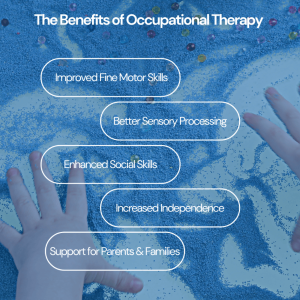When you hear the term “occupational therapy,” you might imagine adults in rehabilitation after an injury or stroke, learning how to regain motor skills. But did you know that occupational therapy (OT) plays a transformative role in the lives of children, especially those with developmental challenges? In fact, it’s all about play. For kids, play isn’t just fun; it’s essential to how they grow, learn, and adapt to the world around them.
In Dubai, with its vibrant mix of cultures and fast-paced urban life, occupational therapy has become an invaluable tool for helping children overcome developmental obstacles and thrive. But why is play such a powerful tool in OT? Let’s explore the significance of occupational therapy for children in Dubai, how it leverages the power of play, and why it’s an important resource for families in the region.
Understanding Occupational Therapy for Kids
Occupational therapy is a form of intervention designed to help individuals develop, improve, or maintain the skills they need to perform daily tasks. For children, those tasks are as simple as getting dressed, writing, playing with friends, or communicating effectively. Occupational therapists work with kids to improve fine and gross motor skills, sensory processing, cognitive development, and social behaviours, all through engaging, playful activities.
In Dubai, where the population is diverse and families come from various backgrounds, a good therapist would tailor these activities to meet the unique needs of each child, ensuring the therapy fits their developmental level, culture, and interests.
The Role of Play in Occupational Therapy
It’s often said that “play is the work of children,” and nowhere is this more true than in occupational therapy. Play isn’t just a distraction; it’s how children make sense of the world. Through play, kids learn how to problem-solve, communicate, and develop physically. Occupational therapy takes this natural inclination to play and channels it into targeted interventions.
For example, a child who struggles with fine motor skills may be encouraged to engage in activities like colouring, building with blocks, or threading beads. To the child, these are fun and engaging games, but to the therapist, these activities are carefully chosen to develop finger strength, hand-eye coordination, and precision.
In Dubai’s clinics and therapy centres, therapists also take into account the child’s environment. From the bright colours of the city’s malls to the rich cultural heritage seen in its festivals and schools, therapists use elements of the child’s surroundings to engage them. Therapy sessions may include activities like dressing up in their traditional attires or practicing cultural crafts.
Who Can Benefit from Occupational Therapy

Children who can benefit from occupational therapy come from all walks of life. In Dubai, many parents seek occupational therapy for their children to address issues such as:
Developmental Delays:
Some children may not hit their developmental milestones as quickly as expected. Occupational therapy helps bridge that gap, enabling children to build the skills they need at their own pace.
Autism Spectrum Disorder (ASD):
Children with autism often struggle with sensory processing, communication, and social interaction. Occupational therapists help them by using play-based techniques to improve their ability to process sensory information, interact with peers, and manage everyday tasks. This ties into the broader topic of ABA Therapy for kids in Dubai, where behaviour therapy and occupational therapy often work hand-in-hand.
Sensory Processing Disorders:
Some kids are overwhelmed by stimuli like bright lights, loud noises, or certain textures. Others may seem under-responsive, not reacting to pain or failing to notice sensory input. Occupational therapists work with these children to regulate their sensory systems, helping them feel more comfortable in their environment.
Physical Disabilities:
Kids with conditions like cerebral palsy, muscular dystrophy, or other physical limitations may need help learning how to adapt. Occupational therapy provides them with strategies and exercises to improve their motor skills and maximize independence.
The Benefits of Occupational Therapy
The benefits of occupational therapy are numerous, and the changes it can bring to a child’s life are remarkable. In this section, we discuss some of the ways occupational therapy can positively impact your child.
Many kids struggle with activities that require fine motor control, like writing, tying shoelaces, or buttoning shirts. Occupational therapists use play-based activities like puzzles, crafts, or building blocks to help improve these skills in a fun and engaging way.
Occupational therapy helps children with sensory processing disorders by using sensory integration techniques. These techniques help children manage their reactions to sensory stimuli, whether they’re overwhelmed by noise and lights or seeking out extra sensory input. In a bustling city like Dubai, where the environment is often full of sensory overload, this is a particularly valuable skill.
Children who struggle with communication or social interaction often find it hard to connect with their peers. Through play, occupational therapy teaches them how to share, take turns, and read social cues. This is especially important in a multicultural city like Dubai, where children need to adapt to various social contexts and norms.
Occupational therapy focuses on life skills that promote independence, whether that’s learning how to feed themselves, get dressed, or navigate the playground. These victories, no matter how small, boost a child’s self-esteem and give them a sense of empowerment.
Finally, occupational therapy doesn’t just benefit the child; it helps the whole family. Therapists work with parents, offering strategies and exercises they can use at home to continue the child’s progress. This partnership is especially important in Dubai, where many families come from diverse backgrounds and may need additional guidance navigating local support systems for special needs.
Conclusion: The Power of Play
Occupational therapy for kids in Dubai is more than just a clinical intervention; it’s a playful, engaging, and transformative experience. Through the power of play, occupational therapists help children develop the skills they need to navigate the world, whether they’re learning to tie their shoes, communicate with friends, or manage overwhelming sensory input.
For parents in Dubai, occupational therapy offers hope, empowerment, and support. By helping children overcome developmental challenges, it gives them the tools to succeed in school, at home, and in the community. And the best part? It all happens through the magic of play.


2 comments
tlovertonet
December 5, 2024 @ 1:57 pmI like the efforts you have put in this, regards for all the great posts.
PirojokInoge
April 9, 2025 @ 11:36 pmdarknet site dark market 2025